The statement underlined how “during the lockdown women have been targeted the most: dozens of arrests and the closure of women’s institutions have been carried out. Perhaps the most shocking case has been that involving Rojbin Çetin of the Kurdish Free Women's Movement (Tevgera Jinên Azad, TJA) who was tortured by police officers in her house while officers were raiding the flat. The police even used dogs to attack the woman.”
The statement also added that “there is a significant increase in the number of torture and ill-treatment cases in official custodial places, in proportion to the increasing authoritarianism of the political power, brought about by the violation of procedural guarantees, long-term custody periods, dysfunctional monitoring and prevention mechanisms or the sheer absence of independent monitoring and prevention mechanisms.”
Reminding that “nearly 100 people were tortured, according to the Turkish Human Rights Association (IHD) report in the first 6 months of 2020 in the South East of Turkey (Kurdish region). At least 2 people were subjected to torture and ill-treatment while in custody” the MRAP underlined that “the institutional culture of impunity is the basis of the development of the use of torture against Kurdish people in the framework of a racist policy.”
The Mouvement contre le racisme et pour l’amitié entre les peuples in its recommendation called upon “the Turkish government to discontinue the racist rhetoric and policy against the Kurdish people and to cease the repression against the Kurdish people and Kurdish political personalities” and “to the Special Rapporteur on contemporary forms of racism to engage with the Turkish government in order to put an end to the racist policy toward the Kurdish people.”














